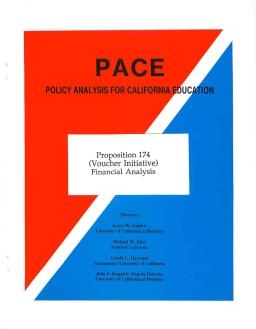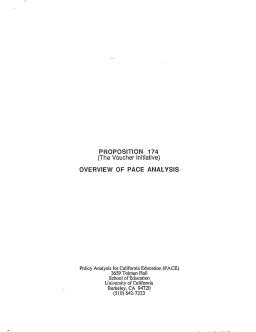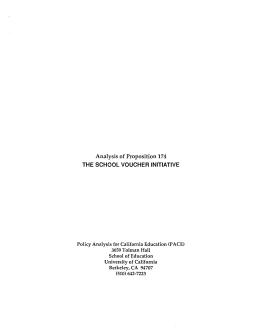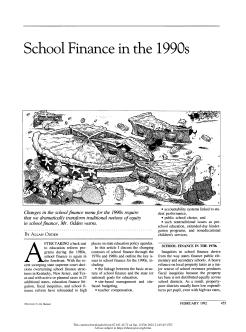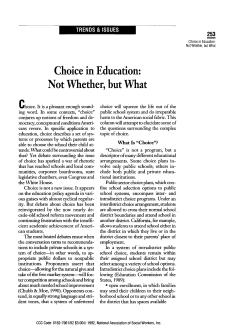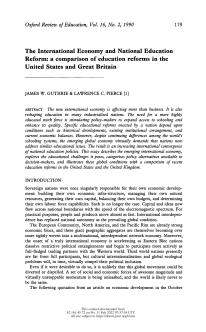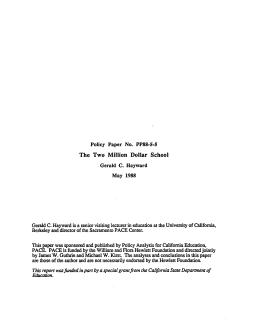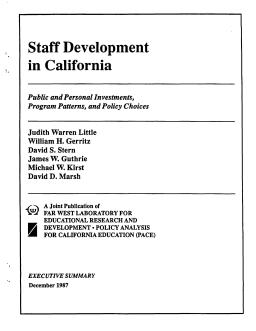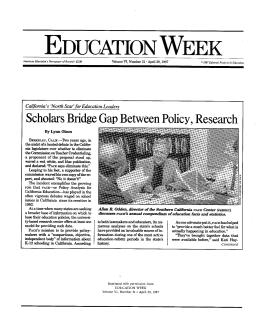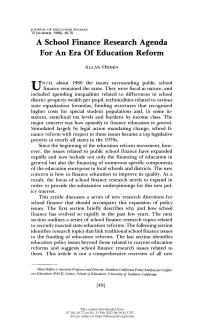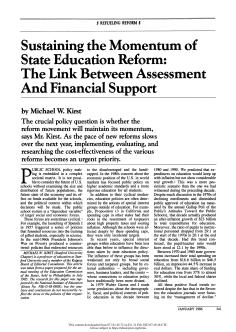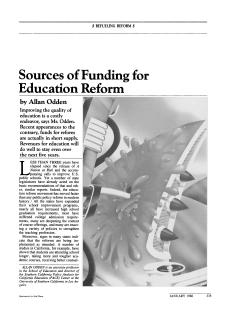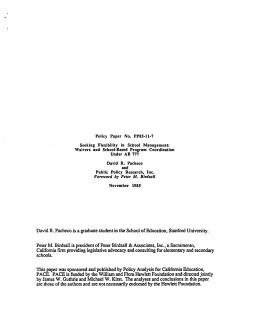Financial Analysis
Published
Summary
The Californians will vote on Proposition 174 which will amend the state constitution to establish "scholarships" for kindergarten to 12th-grade schooling. These new schools will be publicly funded but may have privately selected governing boards and religious orientation. It is unclear whether they will be public or private schools. The paper attempts to reduce uncertainty regarding the financial consequences of the proposed voucher plan and address questions about public costs and possible cost savings.
Overview of PACE Analysis
Published
Summary
PACE has analyzed the financial, legal, and social ramifications of Proposition 174, the school choice initiative, so as to provide Californians and policymakers with accurate, unbiased information. This packet contains important questions and answers about the initiative, summaries of PACE's financial analysis and polling report, and background information on PACE and its directors.
The School Voucher Initiative
Published
Summary
The "Parental Choice in Education Initiative" or Proposition 174, will be voted on by Californians on November 2, 1993. PACE has conducted an analysis of the initiative's provisions to provide objective information to policymakers, parents, educators, and the public. PACE is not taking a stance on the initiative but has produced additional materials related to the initiative and the issue of school choice. These materials are listed in the attached report on school choice.
Published
Summary
School finance has become a prominent issue again due to court decisions and litigation in several states. This article explores school finance changes in the 70s and 80s and outlines key issues for the 90s, including the relationship between finance and education goals, site-based management, teacher pay, accountability, school choice, and nontraditional issues such as preschool and non-educational services for children.
Not Whether, But What
Published
Summary
Debate over school choice has been reignited due to the school reform movement and frustration with low academic achievement. The conversation becomes heated when private schools are included in the system of choice, as proponents believe it will foster competition and improve schools, while opponents argue it will harm public schools and society. This article aims to shed light on the complex issue of school choice.
A Comparison of Education Reforms in the United States and Great Britain
Published
Summary
The new global economy is reshaping education worldwide, necessitating policies that expand access and enhance quality. Despite different educational systems, similar issues need to be addressed, resulting in an international convergence of education policies. The article discusses the emerging economy, educational challenges, policy alternatives, and compares recent reforms in the US and UK.
Published
Summary
In 1987, the Superintendent of Public Instruction released a document detailing the average costs of California schools for 1985-86, providing a brief summary of school expenditures. However, this report lacks in detail, and this report aims to provide more comprehensive and realistic data on school expenditure patterns. The report serves as an analytical base for exploring issues surrounding school expenditures in California, and the data was provided by the state Department of Education staff.
Public and Personal Investments, Program Patterns, and Policy Choices—Executive Summary
Published
Summary
The California Staff Development Policy Study was initiated to assess the possibilities and limitations of staff development in improving classroom teaching and learning. The study aims to answer four questions related to California's investment in staff development, how staff development activities are administered, and how teachers and administrators judge their effectiveness. The study yields eight main conclusions, presented in terms of investment and focusing on improving the capacities and commitments of California's educators.
Published
Summary
PACE, a university-based research center, provides "nonpartisan, objective, independent" information on K-12 schooling in CA. Its analyses have been invaluable to lawmakers and educators during the state's active education-reform period. PACE has played a growing role in debates on school issues, exemplified by a heated debate in the CA legislature over the Commission on Teacher Credentialing. PACE offers a model for providing data for education policies when many states are seeking broader information bases. It has helped provide a better understanding of what is happening in education.
Published
Summary
Before the 1970s, public school finance issues were mainly related to spending inequalities. However, since then, the focus has shifted towards financing education to improve its quality. This article suggests new research directions for school finance that address this policy interest, including topics related to state education reforms, traditional school finance issues, and education policy issues beyond current reforms.
The Link Between Assessment and Financial Support
Published
Summary
Public school policy making is embedded in a complex societal matrix. It is not possible to consider the future of U.S. schools without examining the size and distribution of future populations; the future state of the economy and its effect on funds available for the schools; and the political context within which decisions will be made. The public school system is a "dependent variable" of larger social and economic forces.
Published
Summary
Several state legislatures have acted on recommendations to improve U.S. public schools, resulting in a swift and broad education reform movement. States have expanded school improvement programs, increased high school graduation and college admission requirements, deepened course offerings, and strengthened the teaching profession. Indicators of progress include longer school attendance, tougher academic courses, better counseling, higher achievement test scores, and increased teacher pay. This swift and broad movement gives reason for optimism about its success.
Waivers and School-Based Program Coordination Under AB 777
Published
Summary
California's waiver authority provides school districts relief from Education Code, allowing them to seek alternatives to state requirements subject to local and state review. Waivers are automatically approved unless denied by the State Board of Education, which rarely happens over local objections. Program waivers are rare despite clamor for needed flexibility, possibly due to districts being unaware of the process, viewing it as time-consuming, or using suboptimal local procedures. Oversight hearings are recommended to explore the potential of the waiver process.
